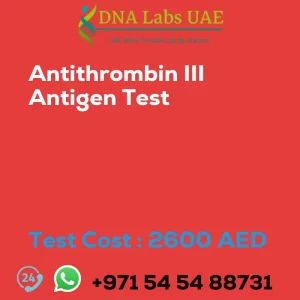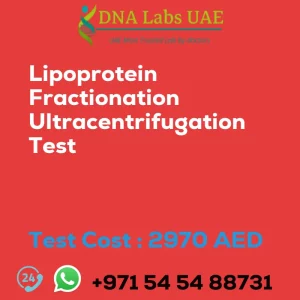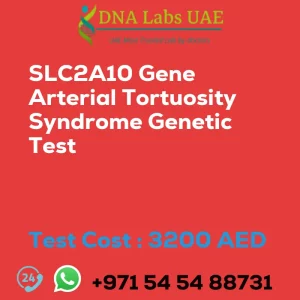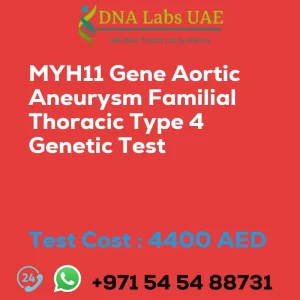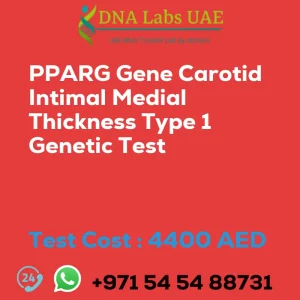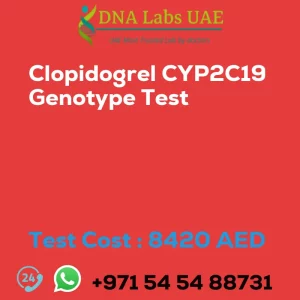RISTOCETIN COFACTOR Test
Components: RISTOCETIN COFACTOR Test
Price: 3090.0 AED
Sample Condition: 3mL whole blood in 1 Blue Top (Sodium Citrate) tube. Mix thoroughly by inversion. Transport to Lab within 4 hours. If this is not possible, make PPP within 1 hour of collection as follows: Centrifuge sample at 3600rpm for 15 min. & transfer supernatant to a clean plastic tube. Centrifuge this supernatant again at 3600 rpm for 15 min. & finally transfer the supernatant (PPP) to 1 labelled clean plastic screw-capped vial. FREEZE IMMEDIATELY. Ship frozen. DO NOT THAW. Overnight fasting is mandatory. Duly filled Coagulation Requisition Form (Form 15) AND Test Send Out Consent Form is mandatory.
Report Delivery: Sample by 7th of the month; Report after 2-3 weeks
Method: Platelet Agglutination
Test type: Thromboembolic disorders
Doctor: Hematologist
Test Department: OS
Pre Test Information: Overnight fasting is mandatory. Duly filled Coagulation Requisition Form (Form 15) AND Test Send Out Consent Form is mandatory.
Test Details:
The Ristocetin Cofactor Test is a laboratory test used to evaluate the function of von Willebrand factor (VWF) in the blood. VWF is a protein that plays a crucial role in blood clotting by helping platelets stick to the site of injury and promoting the formation of a stable blood clot. During the Ristocetin Cofactor Test, a patient’s blood is mixed with a substance called ristocetin, which causes platelets to clump together. The test measures the ability of VWF to bind to platelets and facilitate this clumping process. If there is a deficiency or dysfunction of VWF, the platelets will not clump properly, indicating a potential bleeding disorder such as von Willebrand disease.
The results of the Ristocetin Cofactor Test are reported as a ratio, comparing the patient’s clotting time to that of a normal control sample. A ratio below the normal range suggests a VWF deficiency or dysfunction, while a ratio within the normal range indicates normal VWF function. The Ristocetin Cofactor Test is often used in conjunction with other tests, such as the VWF antigen assay and VWF activity assay, to diagnose and monitor von Willebrand disease and other VWF-related disorders.
Treatment options for VWF deficiencies may include desmopressin (DDAVP) therapy, VWF replacement therapy, or other clotting factor replacement therapies.
| Test Name | RISTOCETIN COFACTOR Test |
|---|---|
| Components | |
| Price | 3090.0 AED |
| Sample Condition | 3mLwholebloodin1BlueTop (SodiumCitrate)tube.Mixthoroughly byinversion.TransporttoLabwithin4 hours.Ifthisisnotpossible,makePPP within1hourofcollectionasfollows: Centrifugesampleat3600rpmfor15 min.&transfersupernatanttoaclean plastictube.Centrifugethissupernatant again at 3600 rpm for 15 min. & finally transferthesupernatant(PPP)to1 labelled cleanplasticscrewcappedvial. FREEZE IMMEDIATELY. Ship frozen. DONOTTHAW.Overnightfastingis mandatory. Duly filled Coagulation Requisition Form (Form 15) ANDTest Send Out Consent Formis mandatory. |
| Report Delivery | Sampleby7thofthemonth;Report after2??3weeks |
| Method | PlateletAgglutination |
| Test type | Thromboembolic disorders |
| Doctor | Hematologist |
| Test Department: | OS |
| Pre Test Information | Overnightfastingis mandatory. Duly filled Coagulation Requisition Form (Form 15) ANDTest Send Out Consent Formis mandatory. |
| Test Details | The Ristocetin Cofactor Test is a laboratory test used to evaluate the function of von Willebrand factor (VWF) in the blood. VWF is a protein that plays a crucial role in blood clotting by helping platelets stick to the site of injury and promoting the formation of a stable blood clot. During the Ristocetin Cofactor Test, a patient’s blood is mixed with a substance called ristocetin, which causes platelets to clump together. The test measures the ability of VWF to bind to platelets and facilitate this clumping process. If there is a deficiency or dysfunction of VWF, the platelets will not clump properly, indicating a potential bleeding disorder such as von Willebrand disease. The results of the Ristocetin Cofactor Test are reported as a ratio, comparing the patient’s clotting time to that of a normal control sample. A ratio below the normal range suggests a VWF deficiency or dysfunction, while a ratio within the normal range indicates normal VWF function. The Ristocetin Cofactor Test is often used in conjunction with other tests, such as the VWF antigen assay and VWF activity assay, to diagnose and monitor von Willebrand disease and other VWF-related disorders. Treatment options for VWF deficiencies may include desmopressin (DDAVP) therapy, VWF replacement therapy, or other clotting factor replacement therapies. |


